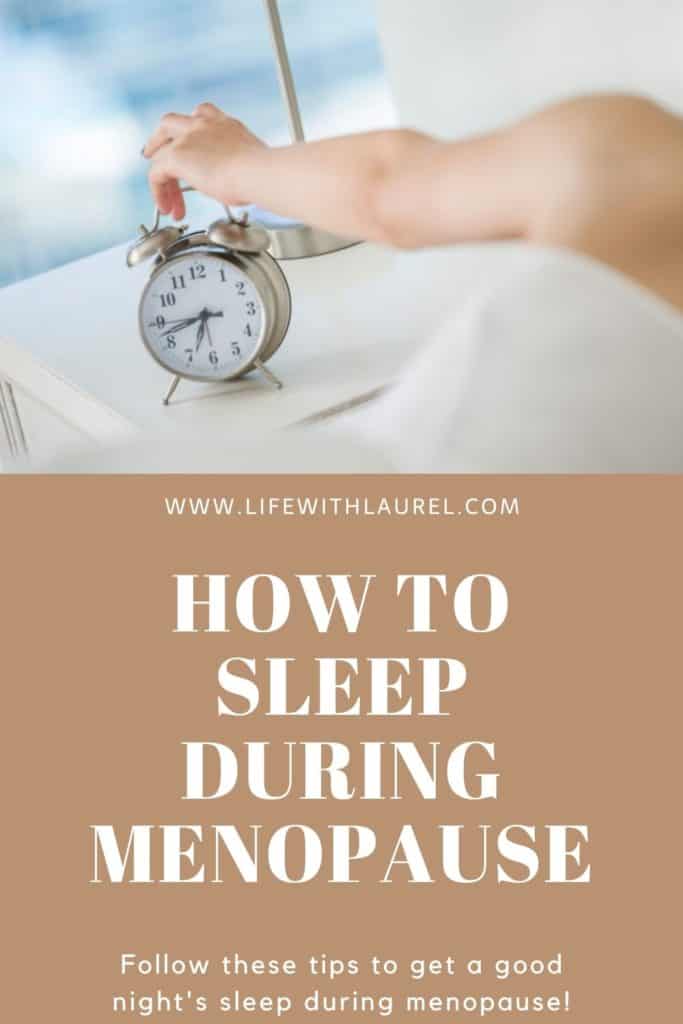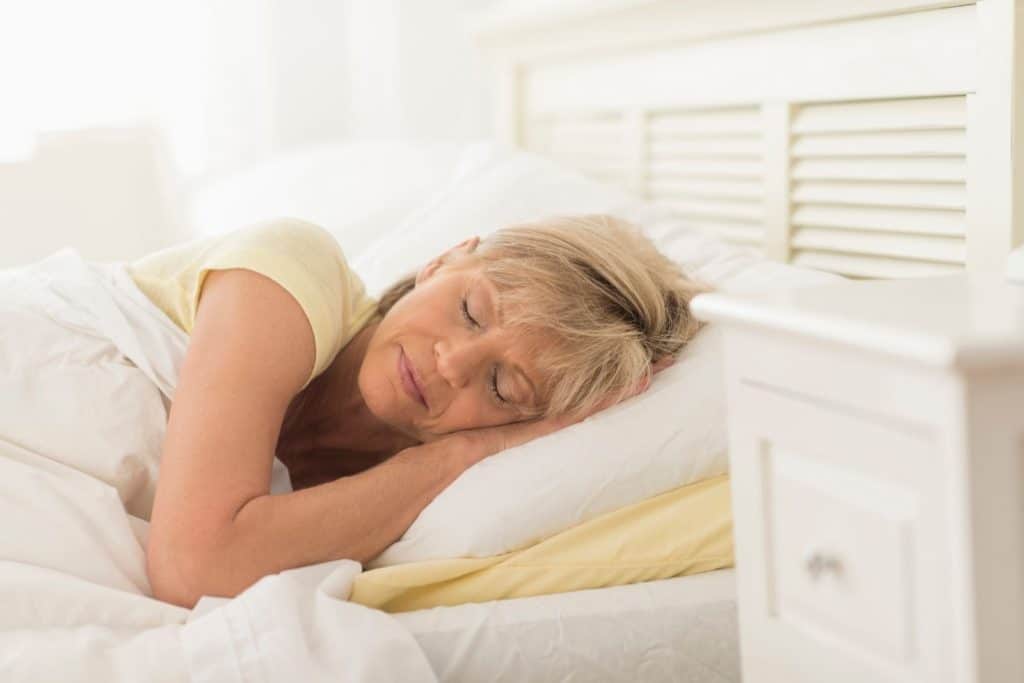Simple Tips To SLEEP Better During Menopause
It is recommended that adult women get between 7-8 hours of quality sleep per night, but for many women in peri-menopause or menopause it just isn’t happening. Many women at this age wake up with hot flashes or night sweats and some have joint pain and discomfort. Desperate ladies want to know how to sleep better during menopause.
According to the National Sleep Foundation, “hormonal changes during menopause can trigger a number of unwelcome sleep disruptions. In fact, up to half of all menopausal women will experience sleep complications.”
Why Is It Important To Sleep Better During Menopause?
During peri-menopause and menopause, sleep affects our metabolism, immune system, and our weight. It also affects how we think and ultimately our happiness.
Metabolism and Weight Gain– Lack of sleep can slow your metabolism and cause weight gain as well. Without sleep we are more anxious and stressed causing the hormone cortisol to increase. Cortisol will cause your insulin levels to rise which will in turn cause your blood sugar level to drop. This has a domino effect to increase your cravings for sugar and then gain weight.
Immune System-Getting the recommended dose of sleep every night restores our body and mind at night. While we sleep, our bodies repair and it detoxifies both our body and our brain. Sleeping keeps our immune system strong to fight off disease and the common cold.
Brain Power and Mood– Sleep effects our cognitive ability and improves our brain’s ability to learn and remember things. Without sleep, our worries take over which causes anxiety.
What’s Keeping You Up Buttercup?
Stress or your partner’s snoring may have you tossing and turning at night. Or, as we get older, getting up to go to the bathroom during the night can also disrupt your dreams.
Fluctuating hormones during peri-menopause and menopause seem to be the biggest culprit to losing sleep. These hormones will be fairly level during the day and then wreak havoc at night causing intense hot flashes and sweats for some. Hormones regulate your energy, the way you function, and how well you sleep. Although the hormones themselves don’t necessarily cause you to not sleep well, their symptoms can cause disruption during the night
Estrogen– as women enter menopause, their estrogen levels will decrease. Lower estrogen impacts your moods, memory and decision making skills, and brain fog not to mention frequent headaches. Add lack of sleep to the mix and its no wonder women feel frustrated.
Low estrogen can also increase joint pain and increase bladder issues which in turn causes sleep issues.
Progesterone-As the “calming hormone”, progesterone decreases during menopause, women may be more irritable and less able to relax.
Melatonin-Melatonin is often referred to as the sleep hormone. Its production increases with evening darkness to promote healthy sleep and orient our circadian rhythm. This hormone will also decrease starting in peri-menopause, causing our sleep cycle to be out of sync.
So what can you do to get a better night sleep before or during menopause?
Simple Tips To Get A Better Night Sleep
Drink Herbal Tea
Drinking a caffeine-free herbal tea may help you relax so you can sleep. Tea with Chamomile or lavender may be used as a natural remedy to treat insomnia. Tea with the herb valerian root is said to be helpful as well.
Read A Book Or Journal
Power down a hectic day by turning the pages of a good book. Be sure it is a regular book and not an electric one whose blue light will keep you up.
By journaling in the evening it gives you a chance to reflect on the day and has a calming effect.
Turn Down The Lights
The blue light from televisions, computers, and hand held devises trick your mind into thinking it is daytime. This makes it difficult for you to drift off into sleep. By turning these items off and finding other relaxing activities before bed, you will find you fall asleep faster.
Other light in your bedroom such as your alarm clock, street lights, and other electronics may be keeping you up. Get blackout curtains and turn the alarm clock away from you so that you can fall asleep easier.
Stretch Or Do Yoga
Stretching and doing yoga relieves aches and calms you before sleep. Try to get in the habit of doing a routine of gentle stretches or yoga before bed.
Meditate
Meditation calms the mind and lowers your blood pressure to help you drift off with a clear head.
Take A Warm Shower Or Bath
The warm water and soothing effects of a bath or shower can signal your body it is time to sleep.
Eat An Early Dinner
By eating an early dinner, it allows your body to digest its meal so that you can rest better. It is recommended to stop eating and drinking 2-3 hours before your head hits the pillow.
Essential Oils
Put a couple of drops of Lavender oil on your pillow before bed. Lavender works as an anxiety reliever and increases relaxation and calm that helps bring about sleep.
Cut The Alcohol Before Bed
If you are used to having a drink before bed, you may notice you don’t sleep soundly. Alcohol may seem to be helping you sleep as you fall asleep quickly due to its sedative properties, but it also wakes you later in your sleep cycle. This is due to the the liver enzymes metabolizing the alcohol.
Watch Your Caffeine And Sugar Intake
Try to cut out caffeine and sugar after 12 pm. These two ingredients keep the mind more active which is detrimental to keeping you asleep at night.
Fruit and vegetables are ok to eat in the afternoon, just cut the added, processed sugar!
Lower The Temperature
Experts agree that the ideal temperature for sleeping is between 65-72 degrees. Set your thermostat to be in that range when you are scheduled to go to bed.
If you are struggling with hot flashes or night sweats, you may want to invest in moisture wicking bedding and pajamas to stay cool through the night.
New Mattress or Pillows
Are you waking with aches and pains? You may be do for a new mattress or pillows.
Take Some Supplements
Melatonin- helps keep your body on its circadian rhythm. It helps your body understand the difference between daytime and night time and when your body needs to sleep.
Magnesium- relieves insomnia by decreasing cortisol, the stress hormone. Magnesium also contributes to relaxing your muscles and gives a sense of calm.
Follow A Night Time Routine
Develop a night time routine that you follow every night. By following this routine consistently it prepares you body for sleep.
Schedule your routine so that you go to sleep and wake up the same time every night….even on the weekends. This manipulates your circadian rhythm and sets your serotonin levels.
Incorporate a few of the above tips into your night time routine to calm your mind and body and help you get a better night of sleep.

The Final Thing You Need To Know To Sleep Better During Menopause
You may be asking yourself, “Does menopause insomnia go away”? With the settling of hormonal fluctuations, insomnia and other sleep problems due to menopause may gradually improve. Each phase of the menopausal transition is highly individual and can vary greatly from woman to woman.
Therefore, try a few of the suggested tips to see if they help. If you are still waking in the night, it may be time to speak with your doctor to check you hormone levels and see if hormone replacement is a good fit for you.
Please comment below with other helpful strategies that you may have found to sleep better during menopause.
Other articles of Interest:



Thank you Laurel! I hope things are going great for you in Colorado. I miss you! Lea Boyar